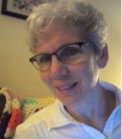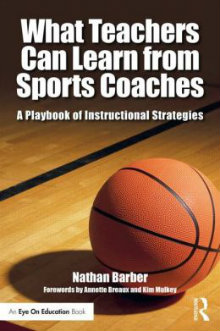Instructional Strategies Sports Coaches Know
What Teachers Can Learn from Sports Coaches – A Playbook of Instructional Strategies
By Nathan Barber
(Routledge, 2015 – Learn more)

I wanted to get my hands on this book. People who know me will think that sounds strange. I am a runner and appreciate athletic performance, but I had never understood the emphasis put on organized sports. In my 15 years teaching, I had never coached athletics at school.
This fall I was asked to help coach the cross country team. I had no idea how to “coach” a herd of moving targets. I followed the head coach’s lead and learned a lot. Could I apply what I learned to the classroom? This is what Nathan Barber asks us to do in his latest book, What Teachers Can Learn from Sports Coaches. I wanted to see what great coaches could teach me about great teaching.
Rethinking greatness

Greatness may come in that “teachable moment.” Or it may be that lesson that students talk about for days. Or it may be the student you reach because you took the extra time to “communicate ‘mastery’, not ‘performance.’” Let me share the “plays” this coachable teacher found most helpful.
Coaching strategies arranged for easy access
Barber has divided the playbook into sections, each focusing on a different group of strategies. As he states in his introduction, the way the book is structured allows the reader to browse the sections that he or she finds most helpful in no particular order.
I think of his book as a cookbook full of recipes. You can go to the “recipe” that suits your interest or need for that day. And you can keep coming back for the pep talk you need to be that great teacher we all strive to be.
Nathan Barber includes strategies in seven different areas. These include communicating effectively, harnessing the power of teamwork, making work meaningful, embracing technology, building a winning tradition, teaching life lessons, and seeking continual improvement. My game plan is to focus on three sections in the review, although the reader will find all of sections beneficial.
Make work meaningful
I must admit that I was intrigued to read what a coach does to “Make Work Meaningful.” Don’t athletes do a lot of drills to get stronger and quicker that have nothing to do with the game? They complain a lot, but they do them because they have to. The athletes stick it out until they get to the “good stuff.”
Wait a minute… don’t some teachers do the same thing? We give students piles of meaningless worksheets, explaining that it is necessary to understand what we will be doing in class later (or next year, or in college). A student who has no dreams of playing in the big “game” will certainly not find meaning in meaningless assignments.
Barber says, “For every minute a coach talks or lectures, a minute passes during which players get no touches on the ball.” Think about that. Every minute a teacher lectures is a minute the student is not engaged in a meaningful learning activity. The advice here is not to never lecture, but to actively involve every student in the learning process as much as possible.
How do we create meaningful activities? “Bring the Why,” to paraphrase Justin Spring, head gymnastics coach at the University of Illinois. How do we bring the “why”? Barber reminds us that by “explaining the why before students ask, a great teacher equips them with confidence (from those ‘touches’), enhances their understanding and provides them with a roadmap for where the lesson and the work are taking them.” Clearly stated learning targets will accomplish this.
wins versus Wins
Barber’s section on “Building a Winning Tradition” is also very helpful. I loved his discussion of wins v. Wins. Coaches build winning traditions by building on the small successes, the “wins” their athletes achieve in practice. Great teachers do the same. We must provide the timely, positive feedback our students need to be successful in the classroom.
By focusing on the wins instead of the Wins (grades or test scores), the Wins will come as a natural extent of the work. Barber reminds us that in the world today patrons and politicians demand Wins from us. Teachers provide meaningful work that builds confidence through small successes.
Challenging work will follow when the teacher has properly prepared the students. Get the wins first in order to get Wins later. We must communicate this to our students and the public.
Seek continuous improvement
The last section reminds us we must “Seek Continuous Improvement.” Barber offers a number of ways teachers can model this practice. First a teacher should develop a Personal Learning Network (PLN). This can be done by connecting with your colleagues in your building, by attending conferences, and by connecting digitally through platforms like Twitter.
Read voraciously – no explanation here. Take advantage of peer observation from both sides of the process – see and be seen. Barber also recommends the power of video (recorded in our classrooms), a favorite tool of coaches to review performance. We should admit, as coaches do, that too much goes on during a game or lesson for us to “see” it all, especially if we are as actively engaged as our students.
Nathan Barber’s book builds like an athletic contest. It starts with activities and routines that build on small successes so that they can be followed by engaging and challenging activities. Make it meaningful, explain the “why,” and keep on improving because “the game has changed.” Our students are “plugged in,” actively a part of, and responsible in many ways, for the “game.”
We can learn a lot from successful coaches. They continue to respond to a changing world. Barber asks, “Will you?” Your answer should be yes.
Joanne Fuchs is in her 15th year of teaching. A 7th grade world history teacher, she is also the lead teacher for her department and a member of the curriculum writing committee. A member of her district professional development committee, she is also actively developing her PLN through chats on Twitter(@geojo22) and attending edcamps. Inquisitive by nature, Ms. Fuchs is always ready to learn and hopes her passion for learning wears off on her students and colleagues.


































